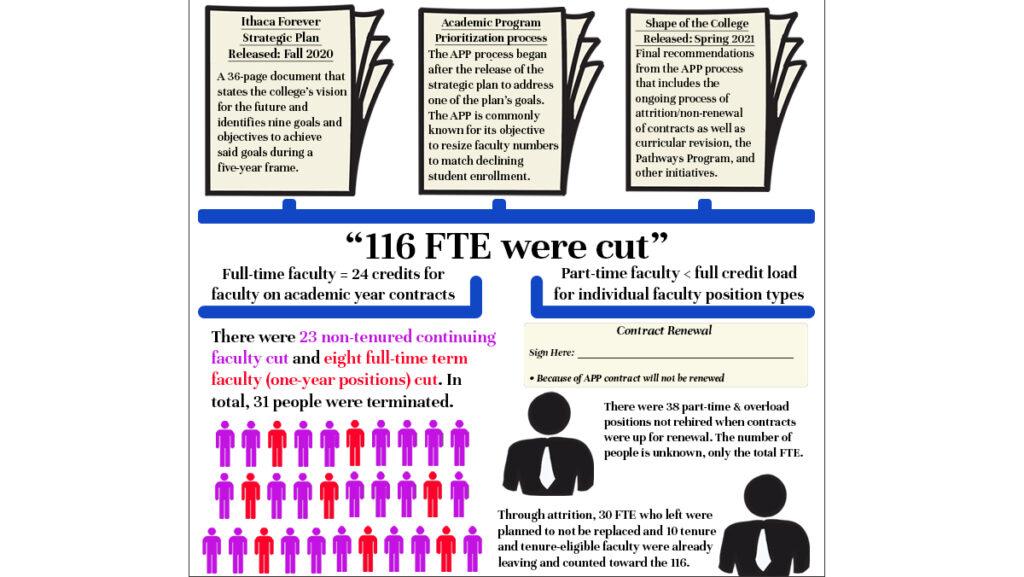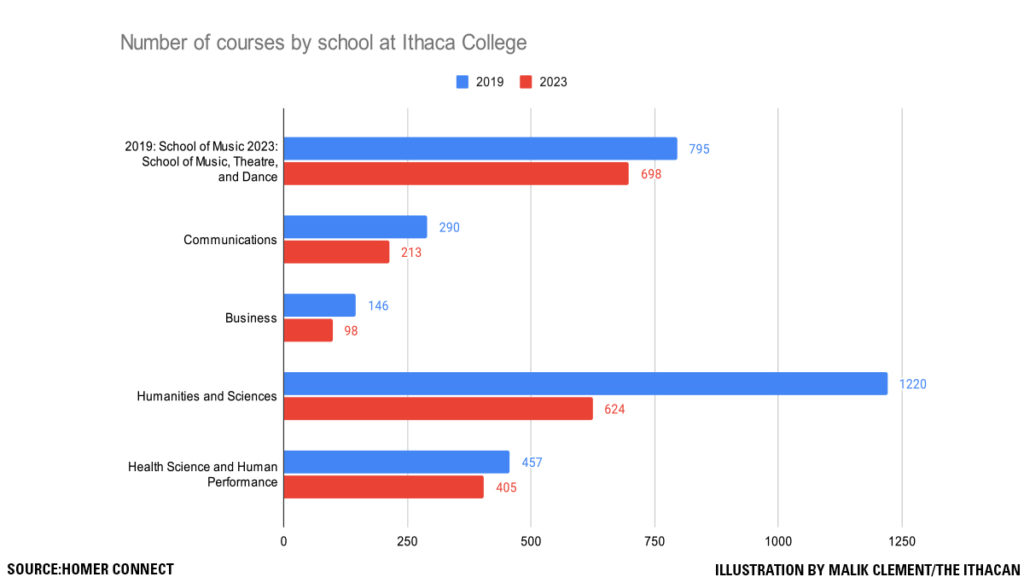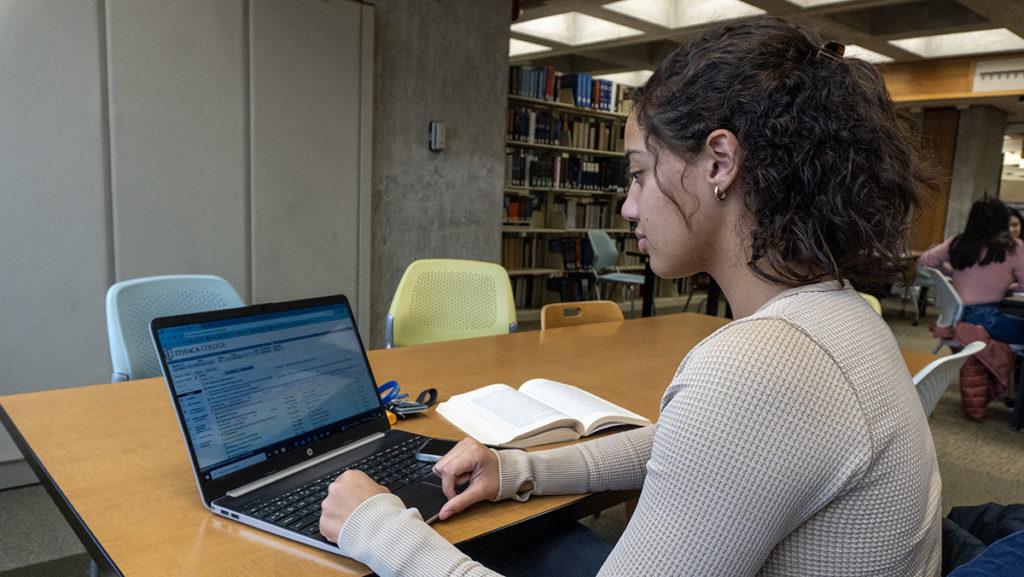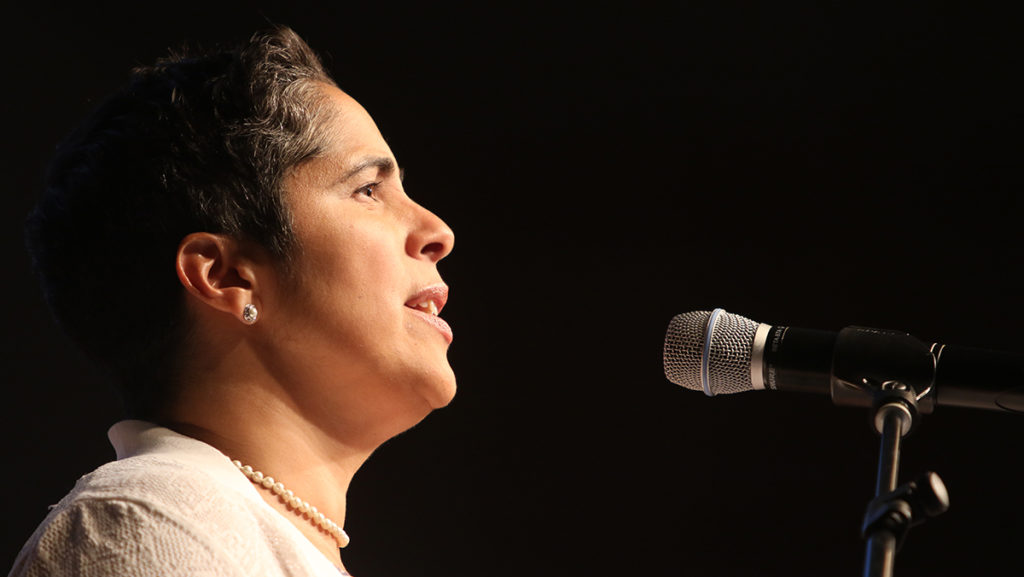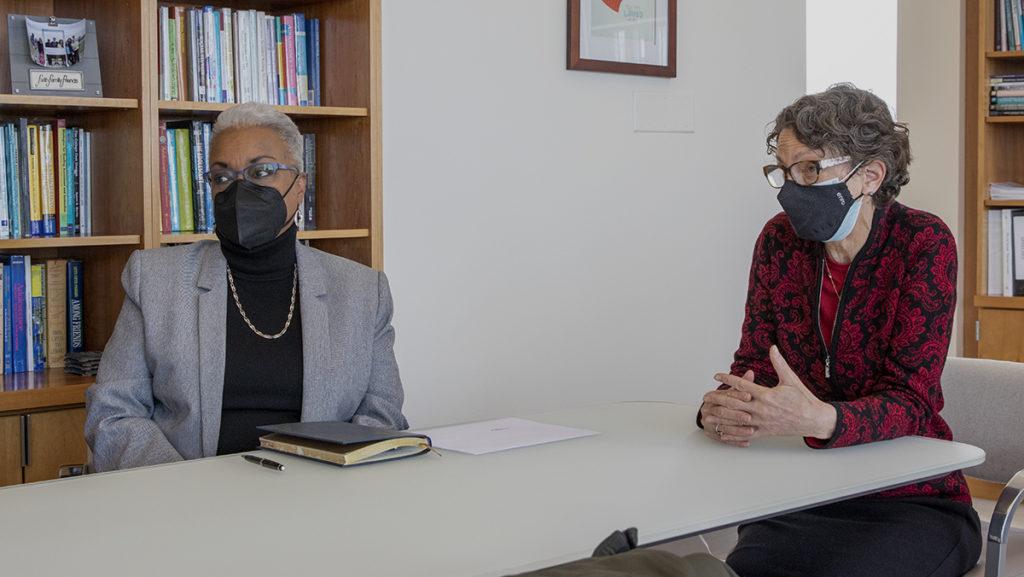The Ithaca College community is adjusting both to the residual effects of the COVID-19 pandemic on the college’s budget and the changes implemented as part of the Ithaca Forever strategic plan to create a more sustainable budget.
The college formally began the process of implementing the Ithaca Forever strategic plan in October 2019. The goals of the plan are to proactively address the national issue of declining student enrollment and to create a budget that matches the new demographics. The plan was launched before the COVID-19 pandemic, but the pandemic accelerated the rollout of changes. The pandemic caused a decrease in the college’s operating budget. The college’s operating expenses for fiscal year 2021 dropped down to $188,656,855 from $231,452,699 in 2020. The budget for fiscal year 2022 is currently set at $222,276,717. The college previously asked departments to cut their budgets for the 2019–20 fiscal year because of anticipated lower enrollment numbers.
Tim Downs, vice president of Finance and Administration and chief financial officer, said the college is a tuition-dependent institution and that room and board make about 90% of the net operating revenue. Tuition for the 2021–22 academic year is $46,610 on top of the $6,868 standard meal plan and a double room cost of $8,976. Former President Shirley M. Collado said she wanted to move the college away from relying on tuition because of lower enrollment. During the State of the College meeting Oct. 5, Downs said the total revenue from tuition and room and board was $211,472,084 in 2019, $190,142,130 in 2020 and $137,978,111 in 2021. The total revenue for tuition and room and board for the 2022 fiscal year is expected to be $182,240,632.
Downs said in an interview that the college is keeping costs for tuition and room and board the same for the 2021–22 academic year, as well as reducing meal plan costs by continuing to insource the dining program.
He said decreasing enrollment was an issue before the pandemic, but the rise in students deferring and taking gap years during the 2020–21 academic year will result in a longer-lasting financial impact. According to the Office of Analytics and Institutional Research (AIR), 1,100 freshmen were enrolled Fall 2020, which was 578 fewer than in Fall 2019. Overall, AIR reports that the college had a total of 6,266 students enrolled in Fall 2019 and 5,354 students in Fall 2020. For Fall 2021, there are 5,239 students currently enrolled.
“If we didn’t match the budget with student enrollment revenue and kept the expenses the same, we’d be running at a considerable operating deficit every year and we just can’t do that,” Downs said. “After a number of years, we would have to close our doors.”
The operating deficit for fiscal year 2020 was $3,446,240 and the deficit for the 2021 fiscal year is $10,282,639. The deficit for 2022 is expected to be $2,135,185. The operating deficit accounts for the total expenses the college has in a fiscal year subtracted by the amount of total revenue.
As a part of the strategic plan, the college implemented the Academic Program Prioritization (APP) process. The Shape of the College document outlines the specific cuts that have been, and will continue to be made, including 116 full-time equivalent faculty positions, as well as 26 major, department and program eliminations.
Downs said more faculty cuts will happen over the next couple of years, mostly through attrition, meaning if faculty retire or resign they may not be replaced.
Downs said the administration is continuously looking for opportunities to reduce annual expenditures beyond faculty and program cuts by restructuring the college. He said so far, some of these opportunities have included insourcing services, restructuring majors and departments, reorganizing the responsibilities of staff and faculty, adjusting vendor services and virtualizing hardware servers.
“On top of the strategic plan implementation, the impact of COVID caused the institution to have to make some short-term cuts to minimize the effect of the pandemic,” Downs said via email. “These reductions included no pay increases for two years, the reduction of retirement plan contributions and the delay of capital plan investments. For the long-term health of Ithaca College, these cuts will be restored over the next few years.”
Interim librarian Karin Wikoff, who has worked at the college since 2004, said the department has needed to find ways to reduce expenses and shift money around because of its limited budget during the COVID-19 pandemic. Now, the budget is starting to recover from the pandemic’s effect on revenue.
Wikoff said the library’s capital budget for physical materials was in the $400,000 before the pandemic and during the 2020-21 academic year dropped to zero. She said this fall semester it has risen to approximately $60,000 for the fiscal year.
Wikoff said there is less student demand for physical materials than there used to be, so it is fine if the capital budget is lowered. She said ordinarily she prepares a budget projection in the fall and another in the late spring, but in the past year, she said she has done 13 different projections, decreasing the budget each time.
Wikoff said she is more concerned about the loss of other resources, mainly employees. She said the library had 27 employees at the beginning of 2020 and now they have 20.
“Some of the positions that were eliminated, it was the right call,” Wikoff said. “On the other hand, with some of the positions that were eliminated, we are still trying to sort out what they did and who will do it now.”
Junior Ellen Chapman is a student manager for the library and said the number of library work study positions offered have decreased from previous years. She said this has impacted accessibility for students wanting to use library space and services.
“The library used to be open all day most days, so you could show up to the library whenever you wanted,” Chapman said. “Now, there are so many times when it opens and closes, [that] even though I work here, I don’t totally know.”
Campus members have made repeated comments about the overall lack of communication about the strategic plan and related changes, as well as their confusion about budget cuts related to COVID-19.
“I am hoping we can help dispel some of the mystery or mystique around this because there are a lot of things changing and a lot of things going on and people may start to connect things that are not necessarily connected and say ‘that must be because of expense cuts,’ and most times they’re not,” Downs said.



